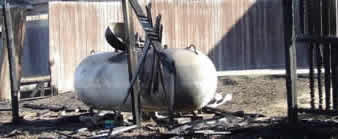
- Frequently Asked Questions - Home
- First Time Propane User
- Propane Tank Color
- Leak Test
- Abnormal Usage and Leaks
- Gallons Lost in LP Gas Leaks
- Checking For Gas Leaks
- Propane Do It Yourself
- Propane Tank Leak
- Exploding Propane Tanks
- Propane Cylinder Explosions
- Valve Open - No Propane
- Propane Tank Disposal
- Propane Regulator Freezing
- Propane BTU Content
- Propane Emergencies
Do Propane Tanks Explode?
This question has been asked of many propane dealers and is also a topic discussed by people that are unfamiliar with propane, propane tanks, propane accidents and explosions involving any type of container storing flammable or combustible material. Propane tanks do not just explode if they fall over, are hit by the lawnmower or a car. In fact, it would be hard to say that a propane tank will explode if it were hit by an airplane or bullet. Many people mistakenly believe that propane tanks in any setting will explode if they are mishandled in some certain way. Let's explore and dispel this common myth.
Propane Explosions 101
Propane tanks do not explode. They do not implode and nor do they rupture or come apart on their own. In fact, bringing a propane tank to the point of "explosion" is a tremendously difficult and time consuming task that's not as simple as most people think. Many people believe that a propane tank "explosion" can occur with the slightest of ease. This is not the case whatsoever and people should understand that a propane tank, operating under normal circumstances will not explode or rupture. Safety devices and mechanisms are in place to prevent explosions, accidents and propane tank ruptures or breaches. Just like any other hazardous material or activity, human error is a primary factor in preventing or contributing to any type of accident, however serious in nature.
BLEVE - Boiling Liquid Expanding Vapor Explosion
The term BLEVE is well known among firefighters and hazardous materials response teams and does not solely refer to propane tanks. A BLEVE occurs when the pressure in the tank exceeds that at which the safety relief valve can safely vent the excess pressure into the outside atmosphere. Relief valves are designed to vent tank pressure at a certain flow rate to the outside atmosphere once the pressure inside the propane tank reaches a certain level and will close once the pressure in the tank falls below that level.
Let's look at a simple example involving something we're all familiar with, a plastic 3 liter soft drink bottle. The soft drink bottle has a 1/4" hole drilled in its side (about the same diameter as the cord on your mouse). This hole functions as the safety relief valve. If you were to blow air into the bottle through the top after unscrewing the cap, the excess pressure in the bottle would be relieved through the opening in the bottle's side causing no damage to the bottle. Now, suppose you attached an air hose that screwed onto the bottle top forming a tight seal and the air hose was supplied by a large air compressor. Turning the air compressor on starts the flow of air into the bottle which in turn creates more pressure than the small hole (relief valve) in the side of the bottle can keep up with. The plastic bottle starts to expand and eventually ruptures. The reason the bottle ruptures is that the amount of increasing pressure inside the bottle is far greater and exceeds that at which the small hole allows to escape. The pressure in the bottle is increasing faster than it can escape through the "relief valve".
Propane BLEVE
A propane tank BLEVE will occur when the container is subject to extreme heat, such as in a fire. While the tank is being heated, the liquid propane inside is being heated causing it to expand. The safety relief valve will open allowing pressure to vent to the outside atmosphere. If the pressure inside the tank grows to a level exceeding that at which the safety relief valve can expel it from the tank, the propane tank may rupture. If flames or a source of ignition is present, the propane will ignite resulting in an explosion. It's important to know that a BLEVE will occur only if the conditions are right, such as being subject to continuous flame impingement over a period of time. The possibility of a propane tank explosion (BLEVE) is extremely remote.

Pictured here is a tank that was involved in a grass fire. The fence caught fire and burned down around the tank. Although the tank is no longer serviceable, it is a testament to the strength propane tanks have as well as the manufacturing standards propane tanks are subject to. Many people believe that an LP Gas tank will explode easily if fire is present or near. This propane gas tank is an example of the rule, not the exception.
Propane Tank Strength
The pictures below are of propane bobtail tanks that were involved in accidents. Each of these 2,600 gallon tanks were involved in rollover accidents and were over 60% full. That means each tank contained over 1,500 gallons (~6,300 pounds) of propane. The tanks may be dented but the force of 10,000+ pounds coming down on the hard pavement is definitely a testament of strength in itself.
